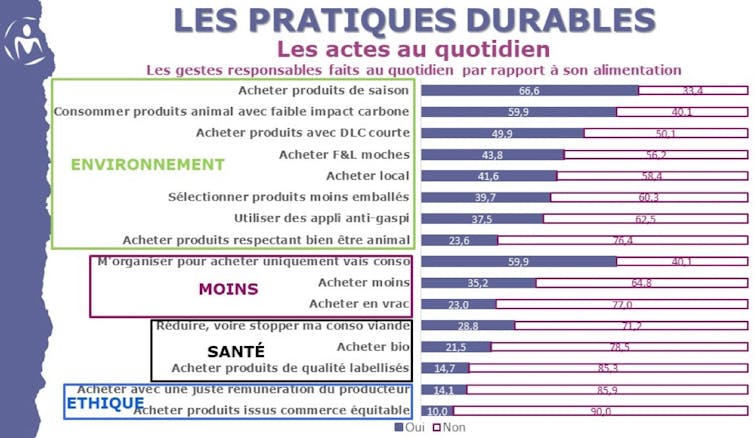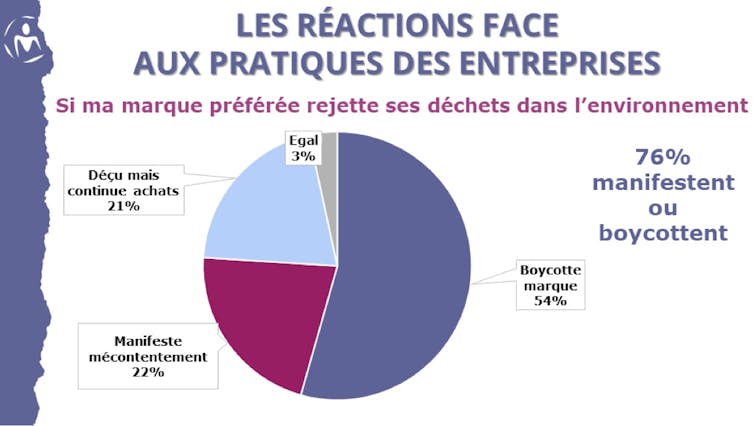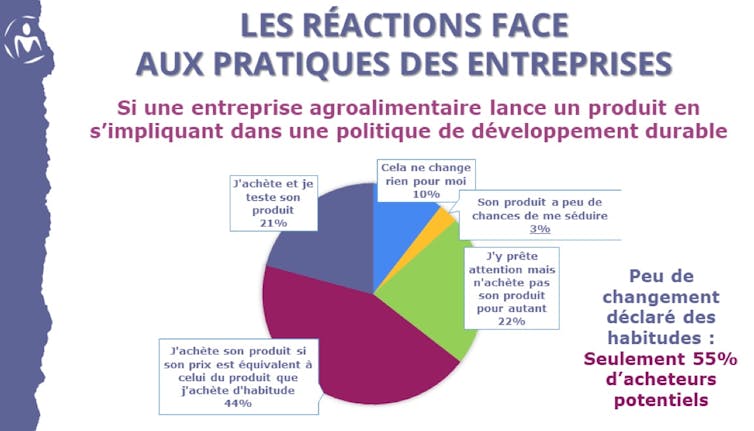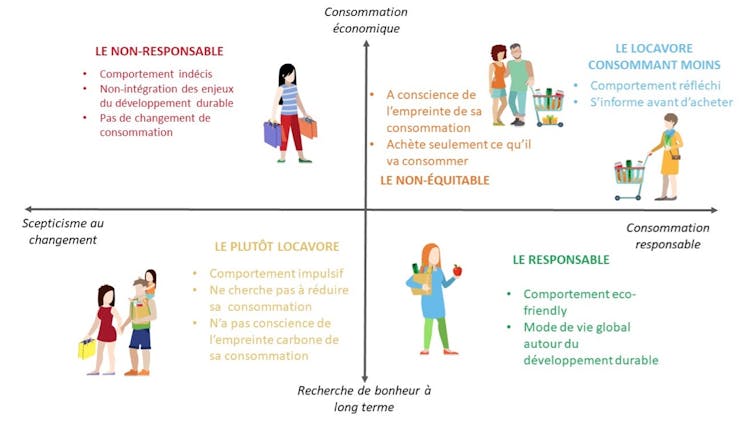Are French consumers responsible?
Can French consumers be considered "responsible"? Thefirst edition of the MARÉSON Responsible Consumption Barometer, launched by the MARÉSON Chair (Responsible Marketing and Well-being), provides some answers to this question. Its aim is to understand the behavior of French consumers and offer keys to facilitate the transition to desirable, valuable, and valued solutions.

Marie-Christine Lichtlé, University of Montpellier; Anne Mione, University of Montpellier; Béatrice Siadou-Martin, University of Montpellier and Jean-Marc Ferrandi, IAE Nantes
The results of the study, conducted among 1,000 people representative of the national population aged 18 and over who were surveyed in June 2022, reveal paradoxical behaviors and reinforce the "attitude-behavior gap" highlighted in numerous studies.
There is indeed a contrast between sincere awareness and the firm adoption of new behaviors. More originally, the results also highlight a critical attitude towards brands that they consider irresponsible, but without any bonus being given to committed brands. Ultimately, consumer attitudes allow us to distinguish between a variety of profiles.
The quest for "deconsumption": a reality?
With the COVID-19 crisis and the manifestations of climate change, many people have become aware of the need to consume more sustainably in order to preserve the planet's resources. However, according to the results of the barometer, few consumers are translating their concerns into significant changes in their consumption habits.
The French are committed to environmental causes and make this known in their own way by focusing their efforts on reducing waste, recycling, and buying local, seasonal products. In their minds, the concepts of the environment and sustainable consumption are interrelated. For 62.4% of respondents, sustainable consumption encompasses environmental considerations. The French therefore show a genuine desire for greater sustainability. However, although they seem ready to commit to this, they are not willing to give up consumption.
Thus, only 35.2% of respondents said they were consuming less.
[Nearly 80,000 readers trust The Conversation newsletter to help them better understand the world's major issues. Subscribe today]
However, 64.8% of them have not changed their consumption behavior. Only 16% of respondents believe that sustainable consumption leads to reduced consumption. 84% of respondents therefore do not consider reduced consumption to be a factor in sustainable consumption.

Free will remains the key word for French consumers: they are not prepared to deprive themselves, are not looking to reduce their consumption, and are not willing to give up their favorite brands.
His responsibility is not universal: only a minority of people attach importance to health and ethical criteria. However, nearly 89% consider that their behavior is environmentally friendly.
Paradoxical behavior toward brands
At first glance, sustainable offerings are booming. Consumers increasingly say they want brands to behave responsibly. Yet a frustrating paradox remains at the heart of green business: only a small number of consumers who express positive attitudes toward environmentally friendly products and services are willing to open their wallets.

Consumers remain ambiguous, acting as censors rather than drivers: they criticize and punish companies that do not make efforts to reduce their environmental impact (nearly 76% of respondents show their dissatisfaction by protesting or boycotting a brand if it dumps its waste into the environment), but they do not really encourage companies' beneficial efforts through their purchasing decisions.

For an agri-food company to be perceived as committed to sustainable food production, it is important for consumers that it manages its raw materials in a responsible manner (reducing packaging, resource consumption, and raw material losses through continuous improvement), that it provides evidence of the virtuous nature of its processes (manufacturing using local raw materials, animal welfare, support for sustainable agriculture, organic certification) and that it is ethical (fair prices, support for farmers, transparency).
However, even though 65% of French people said they wanted to buy a product made by a company committed to sustainable development, only 21% actually do so.
Different consumer profiles
The observatory's findings also made it possible to segment consumers into five profiles based on their behaviors, daily concerns, and consumption patterns: the " responsible " consumer, the " locavore who consumes less," the " non-fair trade " consumer, the " somewhat locavore," and the " non-responsible " consumer.

The MARÉSON-Responsible observatory distinguishes two profiles in the western part of the map: the " non-responsible " (15.5% of respondents) and the " somewhat locavore " (20.2%). The " non-responsible " profile states that they are undecided when making purchases. They do not wish to take sustainable development issues into account, as they perceive them as a constraint on their consumption. As a result, their consumption habits remain unchanged and they make no particular effort to change them.
The " somewhat locavore " tends to be an impulsive buyer, often purchasing items on a whim to satisfy a momentary desire. Their happiness is short-lived. They do not seek to reduce their consumption and buy products that they will not always consume. Furthermore, they are unaware of the carbon footprint of their consumption. Apart from these two groups, everyone consumes responsibly in their own way.
In the eastern part of the graph, three profiles complete the study: the " non-fair trade," the " locavore consuming less," and the " responsible." They represent 26.6%, 25.8%, and 11.9% of respondents, respectively.
The " non-fair trade " consumer is a somewhat unusual type. They are involved in responsible consumption but do not embrace all of its characteristics. Unlike the " mostly locavore," they are aware of the carbon footprint of their consumption and only buy products that they are sure to consume.
The " locavore who consumes less," on the other hand, adopts a thoughtful, responsible purchasing behavior. They do their research before buying and already know what products they want to purchase.
Finally, the " responsible " consumer is the most developed profile in terms of responsible consumption. They have eco-friendly purchasing habits and organize their entire lifestyle around sustainable development.
Which consumer profile do you fit into?
Erratic learning phase
Ultimately, consumers today are in a learning phase that is more erratic than well-defined, due to a lack of concrete representations. Carbon impact has little meaning for them. They need information, evidence, prioritization, concrete action, and involvement in order to commit to real behavioral change.
The question of the responsibility of suppliers, stakeholders, or consumers is raised. This study therefore leads us to consider the educational methods and explanations that should be provided to each of the actors in order to change behaviors towards a sustainable consumption system.
Mathilde Hoareau, a student at the University of Montpellier, made a significant contribution to the writing of this article.
Marie-Christine Lichtlé, University Professor, University of Montpellier; Anne Mione, Professor of Strategic Marketing, Quality Management, and Strategy, University of Montpellier; Béatrice Siadou-Martin, University Professor of Management Sciences, University of Montpellier and Jean-Marc Ferrandi, Professor of Marketing and Innovation at Oniris, IAE Nantes
This article is republished from The Conversation under a Creative Commons license. Readthe original article.